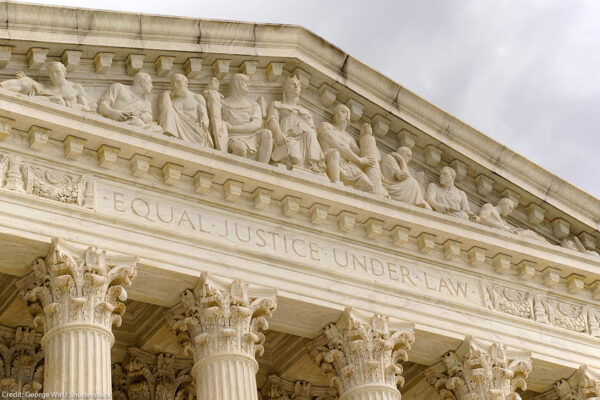Criminal Law Reform
Featured
Arizona
Oct 2023

Criminal Law Reform
Racial Justice
Fund for Empowerment v. Phoenix, City of
Fund for Empowerment is a challenge to the City of Phoenix’s practice of conducting sweeps of encampments without notice, issuing citations to unsheltered people for camping and sleeping on public property when they have no place else to go, and confiscating and destroying their property without notice or process.
U.S. Supreme Court
Sep 2023

Criminal Law Reform
McElrath v. Georgia
Does the Double Jeopardy Clause bar an appellate court from reviewing and setting aside a jury’s verdicts of acquittal on the ground that the verdict is inconsistent with the jury’s verdict on other charges?
U.S. Supreme Court
Jun 2023

Criminal Law Reform
Pulsifer v. United States
This case involves the interpretation of a federal law that allows defendants to avoid mandatory minimum sentences for certain nonviolent drug crimes, allowing judges to impose sentences tailored to their individual circumstances.
Texas
Jul 2021

Criminal Law Reform
Prisoners' Rights
Sanchez et al v. Dallas County Sheriff et al
Decarceration has always been an emergency, a life and death proposition, but COVID-19 makes this effort intensely urgent. The ë–ƒVloghas been working with our partners to litigate for the rights of those who are incarcerated and cannot protect themselves because of the policies of the institutions in which they are jailed.
All Cases
146 Criminal Law Reform Cases

U.S. Supreme Court
Apr 2024
Criminal Law Reform
Free Speech
Trump v. United States
Explore case
U.S. Supreme Court
Apr 2024

Criminal Law Reform
Free Speech
Trump v. United States

U.S. Supreme Court
Apr 2024
Criminal Law Reform
Disability Rights
City of Grants Pass v. Johnson
Whether punishing unhoused people who for sleeping in public when they have no access to shelter violates the Eighth Amendment’s prohibition on cruel and unusual punishment.
Explore case
U.S. Supreme Court
Apr 2024

Criminal Law Reform
Disability Rights
City of Grants Pass v. Johnson
Whether punishing unhoused people who for sleeping in public when they have no access to shelter violates the Eighth Amendment’s prohibition on cruel and unusual punishment.

Virginia Supreme Court
Feb 2024
Criminal Law Reform
Board of Supervisors of Fairfax County v. Leach-Lewis
In this case, the Virginia Supreme Court is considering whether the U.S. Constitution and/or the Virginia Constitution require the exclusionary rule‚Äîwhich protects people from unconstitutional searches and seizures‚Äîto apply in civil zoning enforcement actions. The Institute for Justice, along with The ë–ƒVlogof Virginia and the Speech, Privacy, and Technology Project and the State Supreme Court Initiative at the ACLU, submitted an amicus brief arguing that the exclusionary rule should apply in civil actions to protect Virginians‚Äô search and seizure rights.
Explore case
Virginia Supreme Court
Feb 2024

Criminal Law Reform
Board of Supervisors of Fairfax County v. Leach-Lewis
In this case, the Virginia Supreme Court is considering whether the U.S. Constitution and/or the Virginia Constitution require the exclusionary rule‚Äîwhich protects people from unconstitutional searches and seizures‚Äîto apply in civil zoning enforcement actions. The Institute for Justice, along with The ë–ƒVlogof Virginia and the Speech, Privacy, and Technology Project and the State Supreme Court Initiative at the ACLU, submitted an amicus brief arguing that the exclusionary rule should apply in civil actions to protect Virginians‚Äô search and seizure rights.

Iowa
Feb 2024
Criminal Law Reform
Racial Justice
State of Iowa v. Lawrence George Canady III
In this case, the Iowa Supreme Court considered when rap lyrics are admissible evidence in criminal trials. The State sought further review of a court of appeals decision which reversed the defendant's criminal convictions and remanded for a trial based on errors in the admission of evidence. Together with the Speech, Privacy, and Technology Project and the ë–ƒVlogof Iowa, the State Supreme Court Initiative filed an amicus brief arguing that such evidence should usually be excluded because it is rarely probative and yet creates a high risk of prejudice to the defendant. The Iowa Supreme Court ultimately reversed the Court of Appeals decision, but for narrow and fact-specific reasons. And the Iowa Supreme Court acknowledged that, in cases not involving the peculiar facts of Canady's case, other courts had expressed concerns about the risk that a jury will unfairly use rap lyrics and music as evidence of a defendant's guilt.
Explore case
Iowa
Feb 2024

Criminal Law Reform
Racial Justice
State of Iowa v. Lawrence George Canady III
In this case, the Iowa Supreme Court considered when rap lyrics are admissible evidence in criminal trials. The State sought further review of a court of appeals decision which reversed the defendant's criminal convictions and remanded for a trial based on errors in the admission of evidence. Together with the Speech, Privacy, and Technology Project and the ë–ƒVlogof Iowa, the State Supreme Court Initiative filed an amicus brief arguing that such evidence should usually be excluded because it is rarely probative and yet creates a high risk of prejudice to the defendant. The Iowa Supreme Court ultimately reversed the Court of Appeals decision, but for narrow and fact-specific reasons. And the Iowa Supreme Court acknowledged that, in cases not involving the peculiar facts of Canady's case, other courts had expressed concerns about the risk that a jury will unfairly use rap lyrics and music as evidence of a defendant's guilt.

Georgia Supreme Court
Feb 2024
Criminal Law Reform
Tatum v. State
This case at the Georgia Supreme Court involves the ‚Äúindependent source‚Äù doctrine, an exception to the exclusionary rule providing that evidence that is acquired through means genuinely independent of a prior unlawful search or seizure may be accepted by the court. The ACLU‚Äôs State Supreme Court Initiative, alongside the ë–ƒVlogof Georgia, filed an amicus brief arguing that the independent source doctrine does not apply in this case because the police relied on information acquired from a prior, illegal search when they applied for a warrant to search the defendant‚Äôs cell phone. The Court‚Äôs opinion vacated Tatum‚Äôs conviction and remanded to allow the trial court to determine whether the state‚Äôs decision to seek the search warrant was ‚Äúprompted‚Äù by the prior unlawful search.
Explore case
Georgia Supreme Court
Feb 2024

Criminal Law Reform
Tatum v. State
This case at the Georgia Supreme Court involves the ‚Äúindependent source‚Äù doctrine, an exception to the exclusionary rule providing that evidence that is acquired through means genuinely independent of a prior unlawful search or seizure may be accepted by the court. The ACLU‚Äôs State Supreme Court Initiative, alongside the ë–ƒVlogof Georgia, filed an amicus brief arguing that the independent source doctrine does not apply in this case because the police relied on information acquired from a prior, illegal search when they applied for a warrant to search the defendant‚Äôs cell phone. The Court‚Äôs opinion vacated Tatum‚Äôs conviction and remanded to allow the trial court to determine whether the state‚Äôs decision to seek the search warrant was ‚Äúprompted‚Äù by the prior unlawful search.